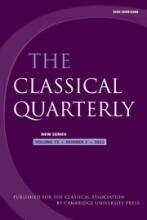Vernae—often but not exclusively taken to be home-born slaves—are usually thought to have had a privileged role within the ancient Roman household. While previous studies have highlighted how these individuals were represented with affection or as surrogate members of the freeborn family, this article uses epigraphic evidence from Pompeii to argue that the reality for at least some vernae was much more grim. A full examination of Pompeian attestations of the word verna reveals that there was a connection to prostitution in over seventy per cent of extant appearances of the noun. Furthermore, contextualizing this phenomenon within the corpus of prostitution-related graffiti more broadly reveals that verna was the single most commonly used descriptor in advertisements for sexual services at Pompeii. Ultimately, the epigraphic evidence from Pompeii suggests that vernae were not safe from sexual exploitation, and it may have been their status as vernae that made them attractive to those wishing to purchase sex.
